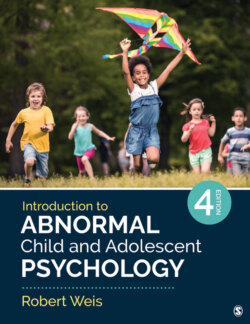Читать книгу Introduction to Abnormal Child and Adolescent Psychology - Robert Weis - Страница 96
На сайте Литреса книга снята с продажи.
How Is Cognitive Development Important to Understanding Childhood Disorders? Cognitive Development
ОглавлениеCognitive development refers to changes in a child’s capacity for perception, thought, language, and problem-solving. Jean Piaget’s stage theory provides a framework for thinking about cognitive development in children and adolescents. According to this theory, development progresses through a series of four broad stages in an invariant sequence. Each stage is characterized by greater sophistication in children’s cognitive abilities (Barrouillet, 2015; Carey, Zaitchik, & Bascandziev, 2015).
Infants in the sensorimotor stage (0–2 years) develop an understanding of themselves and their surroundings largely through happenstance or trial and error. This stage is marked by the emergence of object permanence, the notion that objects exist even when the child cannot see them; pretend play, acting “as if” one object (e.g., a doll) is another (e.g., a real baby); and increased use of language. Deficits in motor skills, pretend play, and language during this stage can indicate a range of neurodevelopmental problems.
Preschoolers in the preoperational stage (2–6 years) engage in increasingly more sophisticated use of language and representational thought. They can form a more complex understanding of their world and can begin to plan their actions before engaging in them. Children in this stage develop theory of mind, that is, the notion that other people have mental states (i.e., “minds”) that can be different from their own. As a result, children can begin to take the perspective of others, understand others’ motives and feelings, and respond with empathy. Conditions such as autism spectrum disorder and social communication disorder are characterized by delays in theory of mind and empathic understanding.
School-age children (6–12 years) fall in the stage of concrete operations. Throughout elementary school, these children develop greater capacity for conservation, that is, understanding that objects may change in appearance, but their amount or quantity remains constant. Conservation is tied to the physical world rather than to abstract ideas. Consequently, children in this stage can learn about subjects connected to the physical world (e.g., arithmetic, reading) but are typically not ready for more abstract subjects (e.g., algebra, literary analysis).
Finally, adolescents (≥12 years) achieve the stage of formal operations, characterized by logical-deductive reasoning. At this stage, adolescents can begin to use general principles to determine specific truths, enabling them to engage in more abstract thought. Formal operations allow adolescents and young adults to comprehend algebra and geometry, psychology and sociology, or philosophy and political science—subjects that young children cannot understand.
